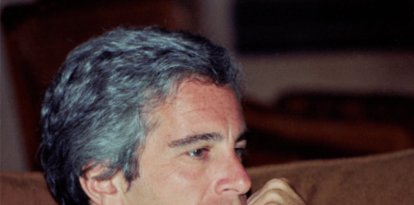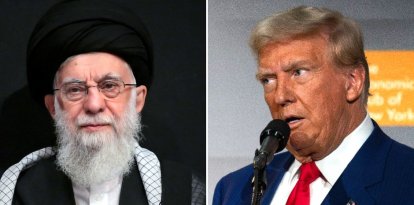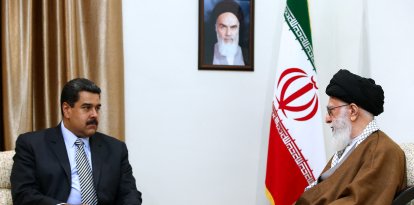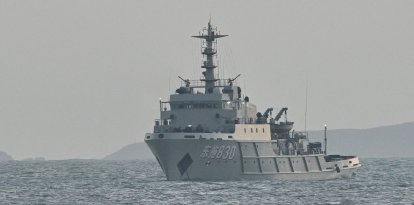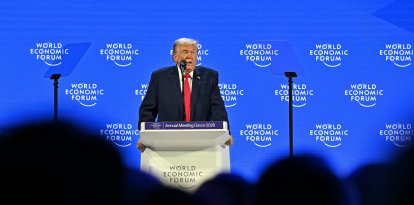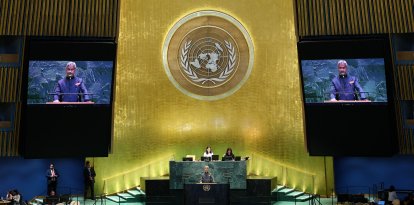The Prosecutor's Office of the International Criminal Court opens an international legal crisis
It took more than half a year for the International Criminal Court to issue arrest warrants for Hamas leaders.

International Criminal Court Prosecutor Karim Khan (AFP)
The International Criminal Court (ICC) has become a focus of international conflict due to a series of measures with catastrophic consequences. Karim Khan, the chief prosecutor, called for the arrest of Israel’s Prime Minister, Benjamin Netanyahu, and his Defense Minister, Yoav Gallant, for alleged crimes committed in the Gaza Strip during the counteroffensive carried out by Israel after the Hamas invasion of October 7.
In a decision that sought to parallel the democratic Government of Israel with the actions of the terrorist group Hamas, the prosecutor also requested the arrest of the three main leaders of Hamas, Yahya Sinwar, Mohamed Deif Diab Ibrahim al Masri and Ismaíl Haniyeh. The measure has unleashed a wave of criticism and questions about the impartiality and proper function of the ICC, which reflect a deep concern about the politicization of international justice and the impact this can have on the efforts of countries fighting the scourge of terrorism.
Khan’s request may not be successful, but it could lead to embargoes and other actions against the country, strengthening Hamas’s position and encouraging other terrorist organizations to attack Israel.
The teacher Eugene Kontorovich, a member of the Kohelet Policy Forum and expert in international law, has been one of the most critical in arguing that the ICC has morphed into a biased entity like the UN, which is trying to accuse Israel of war crimes in a conflict characterized by a particularly low number of civilian casualties. Kontorovich also highlights that it is absurd to accuse Israel of the “crime of hunger” when no one has died of hunger in the territories in question. The truth is that it has been Hamas that has been in charge of stealing humanitarian aid and it has been amply documented how they have kept Gazans away from the distribution centers, even shooting them at point-blank range.
However, according to Kontorovich, diplomatically, this action by the ICC manages to morally equate Hamas with Israel. Kontorovich’s analysis is not isolated. Professor Anne Bayefsky, president of Human Rights Voices, has expressed similar criticism. The academic has also denounced the inaction of the UN Security Council in relation to the Israeli hostage crisis and the sexual atrocities committed by Hamas against Jews. Bayefsky holds, for example, that the meeting that was supposedly held to discuss the hostage situation was, in fact, an informal meeting outside the Security Council, which refused to hold an official session on the matter.
Bayefsky emphasizes that, despite incorrect reports indicating that it was a meeting dedicated to the hostages, the reality is that it was not an official meeting and that, to make matters worse, no UN official attended, which further highlights the lack of seriousness with which the organization views the issue. This testimony is important because it flatly contradicts the accusations made by the ICC prosecutor and its group of “experts.”
The decisions of the ICC chief prosecutor have provoked multiple reactions in the international arena. From the president to various officials and legislators in the United States, many have issued a strong rejection of the plans of the ICC chief prosecutor, Karim Khan. Similarly, Britain has also expressed its disapproval, stating that it does not consider this measure to contribute to reaching a ceasefire or the release of hostages and questioning the jurisdiction of the ICC in this case since Israel is not a State party to the Rome Statute, and Palestine is not recognized as a State. This position is shared by other politicians and international leaders based on the perception that the ICC is acting in a biased manner, focusing on Israel while ignoring crimes committed by other actors in the region.
The ICC took more than half a year to issue arrest warrants for Hamas leaders and only did so when it made sure to condemn Israeli officials in a shameful game of equalization, showing their selective approach, ruining any pretense of impartiality and undermining confidence in international justice. Paradoxically, the news has united the Israeli political arc, strengthening Netanyahu’s position. The Knesset, the Israeli parliament, has signed a historic bipartisan statement against the ICC charges, defending Israel’s right to defend itself and calling the Israel Defense Forces (IDF) the most moral army in the world.
Now, the career of ICC prosecutor Karim Khan has been put under the microscope. Khan, a practicing Muslim, has been criticized for defending controversial figures. Khan’s inclusion in the ICC was partly the result of political pressure, adding to resentment and distrust about the Court’s independence. Karim Khan is a British lawyer belonging to the Ahmadiyya Muslim community. He studied Law at King’s College London, specializing in human rights. In 1997, he began his international career as a prosecutor at the Special International Tribunal for the Rwandan Genocide.
But during the 2000s, Khan participated in numerous international judicial proceedings, distinguishing himself as a defense attorney for vicious criminals. He defended former Liberian dictator Charles Taylor, accused of murder, rape and military use of children, although, despite his efforts, Taylor was sentenced to 50 years in prison. Khan also defended Libyan leader Muammar Gaddafi’s son, Saif al-Islam Gaddafi, who was accused of committing crimes against humanity in 2011 during attempts to quell the uprising that took place against his father’s government. He also defended William Ruto, the current president of Kenya, who has been accused of crimes against humanity. Ruto’s defense was particularly controversial. Khan managed to get the charges dropped, but his appointment as prosecutor in The Hague in 2021 was criticized due to allegations of political interference and violence against witnesses during the Ruto case. Without going any further, one of the key witnesses was murdered.
His client, President Ruto, lamented the recent death of “the butcher of Tehran,” Ebrahim Raisi, whom he considered a “fearless leader.”
As chief prosecutor of the International Criminal Court, Khan was the one who rejected an investigation against Evo Morales for crimes against humanity for Morales’ blockade of the caravan of oxygen tankers in 2020.
Before his election as a prosecutor, Khan served as an investigator for socialist UN Secretary-General Antonio Guterres. In 2021, Khan was elected ICC prosecutor for a nine-year term.
On the other hand, the controversial intervention of Amal Clooney, famous for being the wife of Hollywood star George Clooney, was also the focus of criticism. The human rights lawyer presented an expert report that supports the request of the ICC Prosecutor’s Office. However, Clooney’s assessment has been criticized for completely ignoring the context of Israel’s defense against terrorism.
Clooney defended her decision by saying, “I have served on this Panel because I believe in the rule of law and the need to protect civilian lives,” although she did not explain why a nation in self-defense should be treated at the same level as Hamas, a terrorist organization whose main purpose is the extermination of the Jews.
The Clooney panel’s report was published along with an article aimed at increasing pressure on the ICC to issue arrest warrants.
The international legal crisis that has ignited the ICC prosecution has opened up a range of far-reaching and dangerous consequences, especially with regard to the ability of nations to wage war against terrorist organizations in the future. It has not only exacerbated global diplomatic tensions but has called into question the integrity and objectivity of international justice. But, above all, it has not pleased anyone, since the terrorist organization that has ruled Gaza since 2007 has been offended by the arrest orders of its leaders.
The ICC has not ceased to weaken its original mission, an evil that has been stalking almost all international organizations since they were co-opted by the enemies of the West and placed at the service of the darkest and most sinister interests of humanity.













